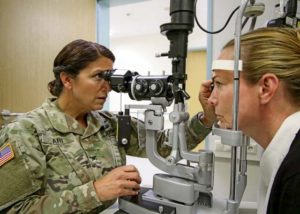
In the early 90s, Army Reserve Officers’ Training Corps cadet Adrienne Ari graduated college with a degree in physics. Although she had long desired a medical career, medical school’s course load seemed daunting at the time so she insisted on pursuing a traditional four-year secondary education and began her career as an Army engineer officer.
Ari, now an Army colonel, was recently named the Armed Forces Optometric Society’s Army Optometrist of the Year for 2019.
“My first assignment (as an engineer) was down the road at Karlsruhe, Germany,” said Ari, now Regional Health Command Europe’s optometrist consultant. “I couldn’t see myself doing it for 20 years. Some of it was the timing because of the [Gulf] War. It was a challenging time for many lieutenants.”
After her obligated tour of service as an Army engineer officer, Ari followed her desires to work in the medical field and transitioned to optometry. Still, Ari had found a home in the Army and a passion for caring for America’s sons and daughters in uniform.
Each year, AFOS selects a federal employee or service member from each of the five services — Army, Navy, Air Force, Veterans Affairs, and Public Health — to represent their respective service as the optometrist of the year. An additional judging rivals those individuals to select an optometrist that goes on to represent the federal government at the American Optometry Association’s competition which represents over 44,000 doctors of optometry.
“[The Army] currently has over 130 active duty optometrists,” said Maj. Jason Hales, chief of optometry at Raymond W. Bliss Army Health Center, Ft. Huachuca, Arizona. “I was prompted to recognize her when I realized she had never received any type of award from AFOS (or any other optometric association) that I was aware of despite her many years of service to Army optometry.”
While awards and recognition may be important to some professionals, Ari’s service to country, patients and community is the true definition of her professionalism.
“I do what I do not for recognition, but because I enjoy being a part of the community, taking care of patients, mentoring other officers and Soldiers and providing the best care we can provide,” said Ari, a native of Mercerville, New Jersey. “What I really love about our profession is helping patients with vague complaints or long-term issues. You’re able to help diagnose the problem and walk away knowing you helped somebody see better or be more comfortable visually. That is the most rewarding aspect of the profession.”
Selection for the recognition goes beyond patient care and is a culmination of efforts throughout the field of optometry and also evaluates social responsibility and contributions in their communities.
“I admire many things about [Ari],” said Hales, who now serves as the AFOS president and nominated Ari for the recognition. “She is a great human being who cares about the success of others. One thing that inspires me is her ability to be involved and effective in many avenues of life. From motherhood to patient care, administrative responsibilities to Army leadership, she finds a balance and succeeds.”
For Ari, a mother of four who also leads the local Girl Scouts of the United States of America’s overseas committee, service to community is essential to teaching others how to succeed and overcome obstacles. In addition to clinical care, Ari’s involvement in professional organizations, residency programs and even fostering new operational initiatives to support combatant commanders across Europe exemplifies her involvement in the profession resulting in her selection.
“In some ways it’s more rewarding [to be a uniformed optometrist] because what we do is important on the battlefield. Many take vision for granted. But [in combat) your life depends on your [fellow Soldiers’] abilities to see,” said Ari. “What we do is important, it’s rewarding.”


